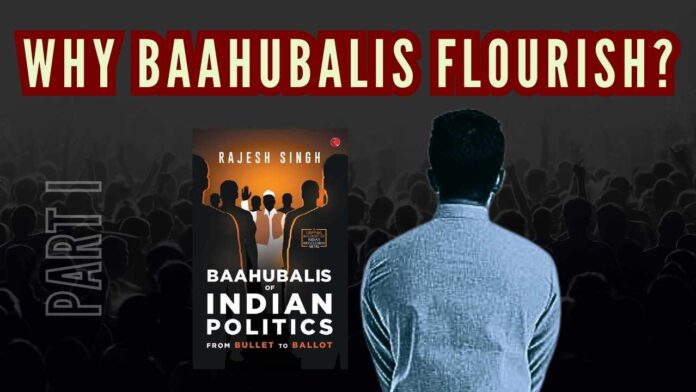
Balahubalis in politics
Once upon a time, many years ago, musclemen employed by politicians for vote-gathering and resolving issues that needed a bit of external and not-so-gentle persuasion, decided that they were as good as their employers and could contest elections themselves. The reasoning was: If they could help others to get votes, why should they not use that expertise to vote themselves into positions of power?
And thus came, especially from the 1990s onwards, a long string of baahubalis who manoeuvred their way into electoral politics. They were coopted into mainstream parties by the very leaders whose interests they had served earlier, and even those against whom they had once worked.
Their success was driven by their ability to employ tactics that had served them well thus far, an ability that they had honed over the years, especially from the 1980s on when the Congress party was still in a dominant position across the country and various regional parties had established themselves as important players—with both needing the baahubalis on their side to outsmart the other.
The rise of such unsavoury elements in politics has been consistent from thereon. According to data available from the watchdog, Association for Democratic Reforms (ADR), 29 percent of the candidates who won the 2019 Lok Sabha elections had declared crimes of grave nature against their names. In the 2009 elections, 15 percent of the candidates who contested had criminal records; and, 13 percent of the candidates in the 2019 elections were accused of heinous crimes such as murder and rape.
Not only did musclemen-netas place themselves in pole positions but they also brought in their family members into electoral politics, often at times when the situation prevented them from contesting elections and they needed proxies in the Assembly or Parliament, thus giving rise to the baahubali dynasty phenomenon.
The seeds of the musclemen-politician nexus were sown towards the late 1960s, when the Congress party suffered electoral setbacks in some state elections as well as nationally. It reached out to the baahubalis, who provided various services ranging from rigging polls to intimidating rivals. Money was not a problem since the flexing of muscles brought in the funds. But as the Congress began to weaken in the 1990s, the musclemen-politicians cast their attention to the regional parties and began to align with them. Being adaptable creatures, they had no hesitation in teaming up with whoever patronized them, regardless of the ideological affiliation of these parties. Not surprisingly, one will note that most baahubalis have done business with the Rightists, the Leftists, the Centrists, and the regionalists, at different points in time.
The controversial end of one notorious baahubali, Atiq Ahmed, who along with his brother and accomplice, Ashraf, was killed in a recent shootout while in police custody, has revived the criminal-politician nexus debate nationwide. Atiq’s is a classic rags-to-riches story. He was one of the early starters, beginning his career in crime as a small-time pilferer in Allahabad (now Prayagraj) of coal from the railway tracks. He then got into the railway scrap business, and success came for two reasons: the high-handed measures he used to terrify business rivals, and, his nexus with influential people.
By then he had created an army of foot soldiers fanatically loyal to him, and who did not hesitate to twist arms or even break them if their boss desired. He got into the real estate business and went deeper into government contracts. A senior police officer who was posted in Prayagraj in the 1990s and is since retired told this writer on the condition of anonymity, ‘There was nothing the police could do. Our hands were tied because Atiq enjoyed political patronage. If he wanted a plot of land or some other property, his minions would bring the legitimate owner before him. Either the owner signed the sale deed in Atiq’s favour, at a throwaway price or even for free, or he was dealt with harshly.’
Old-time residents of the city to this day recall his influence. Said an elderly man, ‘I know of an acquaintance who threatened to report a matter of extortion by Atiq’s gang. Atiq, who was in a generous mood, simply grinned and said, “Go to the chief minister. Let’s see what you get.” The fact is, when Atiq put his finger on a thing, it became his. No questions asked.’
There isn’t any doubt that Atiq received cover from the Samajwadi Party, which made him an MLA multiple times, and once, a Member of Parliament. Ironically, it was this elevation that triggered a chain of events that would eventually consume the dreaded gangster.
Atiq represented the Allahabad (West) Assembly constituency. After his shift to Parliament, the seat fell vacant, and the don proposed the name of his brother, Ashraf, as a candidate—a proposal which the Samajwadi Party readily accepted. Ashraf faced Bahujan Samaj Party (BSP) candidate Raju Pal. Ashraf lost, much to Atiq’s alarm. Any seasoned politician would take wins and defeats in his stride and move on. Atiq had become a seasoned politician by then, but he was also a gangster, for whom a defeat cannot be forgiven or forgotten.
Months after the poll debacle, Raju Pal married only a few days before, was waylaid on the streets of Prayagraj while moving in a vehicle along with some of his supporters. He was showered with bullets. When his men tried to race away with the injured Pal, they were stopped again and more bullets were pumped into Pal; he was declared dead on arrival at the hospital.
In the four decades of his criminal career, Atiq was convicted just once, and that too only weeks ago—in connection with the abduction of Umesh Pal, a key witness in the Raju Pal murder case. In all these years, either the evidence against the don was weak or witnesses turned hostile or judges recused themselves from hearing his case.
(To be continued)
Note:
1. Text in Blue points to additional data on the topic.
2. The views expressed here are those of the author and do not necessarily represent or reflect the views of PGurus.
PGurus is now on Telegram. Click here to join our channel and stay updated with all the latest news and views
For all the latest updates, download PGurus App.











The great Association for Democratic Rights does not consider political corruption as HENIUS CRIME. It is the in successfully executing the corruption the rapes and murders are the tools. The minute they add corruption to the list of HENIUS CRIMES, we will have over 90 % of the MPs and MLAs falling in the list of alleged criminals. Judiciary also appears to be not keen prioritizing the issue. If in the Maharashtra case a split in a political party is accepted it would be a death blow to the Family Owned Parties because it will free the MLAs and MPs who are like bonded labor controlled by BAHUBALIES even when they have the majority.
What happened with Indian embassy office in San Fransisco can happen with PGURU office.
Sri Iyer & PGURUS to take help from USA Federal Police for protecting from secret China Police stations in USA & Pak ISI agents in USA for they are active in Canada (supported by Justin Trudeau) & USA (advisors & fund raisers / sponsors of Joe Biden)
They flourish because there was no Sri Iyer nor PGURUS to report moreover, both operate from remote America – difficult to send threatening goons there